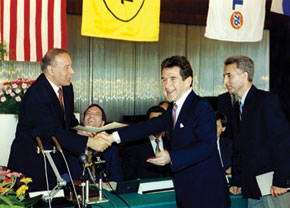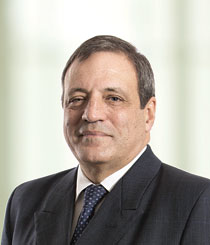The signing of the Contract of the Century on 20 September 1994 was a defining moment in the history of the newly independent Azerbaijan. The deal with 11 foreign companies to develop the Azeri-Chiraq-Guneshli oil fields in the Caspian Sea brought investment, technology and, in due course, oil revenue flowing into Azerbaijan. Twenty years ago the country was a very different place. From his home in the UK, Britain’s then minister for energy, Tim Eggar, shares his recollections of the period and the signing ceremony with Visions’ Anne Thompson-Ahmadova.
When were you first aware of the substantial oil and gas deposits in the Caspian?
I think it must have been in 1989. I saw news reports and then further reports of the fighting in Nagorno-Karabakh. Although I had been a Foreign Office minister in the UK, that was my first realisation of the internal tensions still existing in the Caucasus. I also started out of interest to look at the history – it was then that I realised the importance, still, to the then Soviet Union, of the oil in the Caspian. That’s when my interest was sparked and I also linked it in with the German attack on the Soviet Union, the drive for the Caucasus and so on. Little bits began for me personally to fit together.
Then I became UK minister for energy in 1992 and obviously we had just seen the break-up of the Soviet Union. From the UK’s national point of view that whole region was extremely important. Also I suppose we realised that the newly independent republics were going to survive as independent states and should be treated accordingly.
GRIM SITUATION
It was a very different time…
It’s almost impossible now to realise just how much turmoil there was and how frankly ignorant I and others were of that region, because it had always been shielded by the Soviet Union, access was very difficult. And one of the other things that I did when I began to take an interest was meet for briefings in London with experts on the region. They were basically academic experts; they weren’t experts that were necessarily inside government.
When did you first visit Azerbaijan?
I was trying to actually pin down the date. It must have been early 1993 as it was a couple of months after the UK had got an ambassador physically there. The UK embassy when I went was based in the old Intourist, which was reasonably near the SOCAR office. Co-ordination was difficult and I remember on one visit – not on my first – President Aliyev lent me the old first secretary’s guest house – which was lovely except that it was very cold because nobody could heat anything. There was very little water and when there was water it was all filthy. When I stayed there it must have been early 94 or late 93. President Aliyev had just come back from Nakhchivan to take charge of the country. People forget – Baku even Baku, never mind the rest of Azerbaijan, was really pretty desperate.. It was difficult to get food in adequate quantities. Things didn’t work. People were unpaid. It was very, very grim.
Normally that sort of what I would call nation-building relationship would have been the responsibility of the Foreign Office minister. I had been a Foreign Office minister and, to be frank, the relevant Foreign Office ministers weren’t particularly interested in building relations in that part of the world. So the then prime minister, John Major, said, well, could I make representations, as it was very important from the UK national interest that we really took the country seriously. At first it wasn’t just Azerbaijan, it was also Kazakhstan and Turkmenistan, and Uzbekistan to a lesser extent. So I spent a lot more time than would have been normal for somebody with my responsibilities.
PRESIDENT HEYDAR ALIYEV
What were your impressions of President Aliyev?
People talk about the blemishes and everybody has blemishes, but I think he was – and I mean this absolutely sincerely – a very great man. I think he’s probably the only really great man that I’ve got to know. I would say Thatcher was a great woman but he was a very, very exceptional man. I don’t speak any Russian, he didn’t speak any English, but through interpreters came that pure ability. He had the best memory of anybody I’ve ever met. Certainly in my dealings with him, if he said something definite, it happened; if he didn’t say something definite, then you knew that what he said might or might not transpire.
He must have been a very effective person, because of what he achieved before he went to Moscow. Whatever one thinks of the role that he had in Moscow, the fact is that he was the first person from a Muslim republic, as I understand it, to be in the Politburo. From that, he came back to Nakhchivan and did what he managed to do in the circumstances; i.e. he came back to Baku when really he was at considerable personal risk – and again people forget that – and managed the internal politics, which were very difficult. I mean Elchibey followed by Huseynov.
(Heydar Aliyev came to Baku from Nakhchivan in 1993 at the request of the then president, Abulfaz Elchibey, who promptly fled the city. The country was in turmoil as rebel commander Surat Huseynov had taken the city of Ganja and was threatening to march on Baku. Heydar Aliyev took charge, stabilising the situation, and Surat Huseynov became prime minister. Mr Aliyev was elected president later in 1993. – Ed.) All of this we knew in the UK government. It was a very precarious situation for Mr Aliyev, for him personally and for what he represented. It was a courageous thing to do and he did it very skilfully.
In the context of the time, I think he did it as reasonably in terms of the way in which opponents were treated as one could have expected, given the history of the country. Now that’s not a view which the historians or the people looking back necessarily share but I – I won’t say having lived through it, but having seen it, I think that it was a very remarkable achievement. He was a very, very remarkable man, no doubt about that.
And I’ve got little doubt that had he not been able to do what he did, that Azerbaijan would have gone through a much longer period of turmoil than it did. And I wonder whether without – and we now get on to the contract – I wonder whether it would be a bit much to question whether that contract would ever have been signed. But I’m pretty confident that the oil revenues would have flowed into Azerbaijan very much more slowly.
 A smiling Tim Eggar (seated) watches as President Heydar Aliyev (left) shakes the hand of BP’s John Browne at the signing of the Contract of the Century. Photo: BP
A smiling Tim Eggar (seated) watches as President Heydar Aliyev (left) shakes the hand of BP’s John Browne at the signing of the Contract of the Century. Photo: BPSo he saw the opportunity to bring income into the country and, if you like, to do two things: to get Azerbaijan’s only real natural resource flowing for all the benefits that obviously brings, but also to use that to effectively guarantee the independence of Azerbaijan. Again one’s got to remember that Nagorno-Karabakh was still very tense. It was a very, very difficult balancing act, because Russia was constantly trying to find ways to put pressure on Azerbaijan. The way in which he put together the original consortium was extremely clever, bringing in lots of different countries’ economic interests and, basically, playing off all the powers – I use the word in the 19th century sense – that might possibly be there to destabilise Azerbaijan. It was a formidable undertaking.
Once he was in a position to make decisions he moved very quickly. At the dinner after the Contract of the Century, Huseynov, who people forget was still extremely powerful at that time and still had armed men at his disposal, made it very clear to me that he was not happy about the signing. So even at the time when it had been signed and at the dinner afterwards, the man who was prime minister of the country was opposed to it. I remember that when I went out twice in 1994, both times I was warned – I don’t want to dramatise it – but that the security situation was not good, from my personal point of view. So you know putting it all in context it was really pretty formidable. He took a calculated risk, he put it together very well.
I don’t want to exaggerate, but I did form almost a personal bond with him. I think he was somebody actually who valued personal relationships to an extent that perhaps is unusual amongst both business people and politicians. When he came to the UK as a guest of the UK government in early 94, we talked quite extensively about how to structure a contract and again he was open and realistic. Clearly from the UK’s point of view, our interest was that our major flag-bearing company BP had a very major part in that contract, that was always both a spoken and unspoken objective. But it was very clear to me very quickly that the sort of structure which would have favoured BP exclusively was not something that he thought was in Azerbaijan’s national interests and he was right actually. In the circumstances at the time he was right to spread the contract. He probably included too many companies, but logically it was difficult to close the door once you’d found a role for Turkey and for Norway and so on.
Of course, all the oil companies saw the opportunity as being vast and world scale, which indeed it was, although I think it’s fair to say that the early expectations of further oil discoveries offshore along the same sort of trend to the ACG fields has been a bit disappointing. Obviously they’ve got gas, but people at that time were expecting a lot of oil, so that the size of the prize is probably less than people at the time expected.
SIGNING CEREMONY
What was the atmosphere in September 1994 when you came to Baku for the signing?
First of all, we had been on standby to come, I think for about two or three months. The structure was clear, the participants were clear and the percentages, I think, were moveable feasts. The message I got from the Azeri ambassador in London was “we’re just waiting for the right time” and the right time was to do with the Baku political situation, because it was clear that the president had a lot of work to do to see off the various different interested factions.
What are your recollections of the event itself? I’ve seen photos of the signing ceremony where everybody’s smiling.
When I last went to Baku there was that photo of the actual signing all over the place. I went into SOCAR’s offices and they pointed it out to me. So I think one was aware that it was a very significant event for the president and for Azerbaijan. I remember thinking at the time, here is a man who has not been brought up and trained as a Western politician, but just naming it Contract of the Century, which at the time seemed a little bit grandiose, was actually a stroke of brilliance, because that name stuck. Certainly in Azerbaijan’s context, it was. If you look at the 1900s right the way through to 2000 and if you look at the history of the Azerbaijani oil industry ahead of the First World War, on any reasonable analysis it was the contract of the century; also it was in terms of geopolitical oil supply. I was thinking yesterday, is there another international oil contract signed in the last century, which had anything like as big an impact, both economically and geopolitically? I can’t think of one.
EMPOWERING AZERBAJIAN
What do you think the contract has done for Azerbaijan? What has it brought the country?
Well, I think clearly it’s given it the economic ability to thrive. The last time I went to Baku it was almost unrecognisable from the Baku I visited in 1993, and I gather that it’s become even more unrecognisable since. Friends who’ve been there come back saying “you will not believe” and so on, so it’s clearly done that. I think it’s empowered Azerbaijan from the economic point of view – it enhances independence dramatically, as of course has the pipeline. The terminal and the pipeline were always envisaged as part of the development, admittedly at the very, very early stages and on a completely different route.
I think that, to be less flattering, the wealth hasn’t spread down as far as it should. I think the difference between Baku and the rest of the country is probably not as one would have expected in a Western democratic country, and there’s obviously issues about democracy. So has the revenue from the Contract of the Century been as fairly spread amongst the population as perhaps a Western politician would be looking for? I think probably not and I think that’s a pity. But going back to my original point, if that contract hadn’t been signed at that time, there wouldn’t in my view be anything like the prosperity or the strength of independence that there’s been. So the pluses of signing that far exceed any disappointments.
Do you have any connections with Azerbaijan these days?
Well, I started what was then the Anglo-Azeri Society and is now the Anglo-Azerbaijani Society, and I must have started that when I left government, so in about 1997. I did that for about five years, and I also was involved as the CEO of an oil company and we did business in Azerbaijan. Since then I’ve made occasional visits from a business point of view, but I’m now chairman of a company called Cape and we have a joint venture with SOCAR working on the AIOC offshore platforms and Sangachal terminal.
I was also non-executive director of Anglo-Asian Mining until 2008, which developed a gold mine there. That was the last time I went, to Baku and up to the mine, which was fascinating. My wife has got very fond memories of Azerbaijan because she came with me once and we saw quite a lot of the country together.



